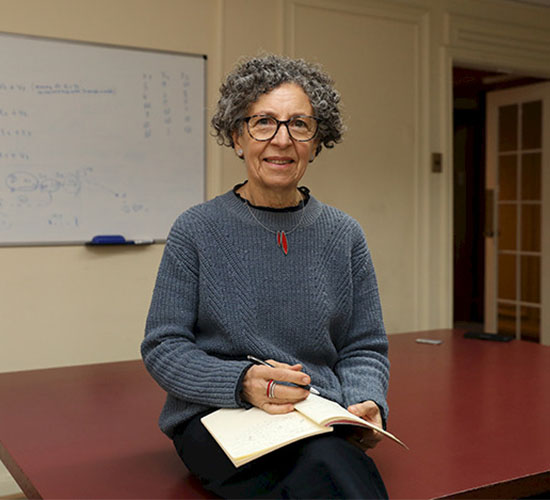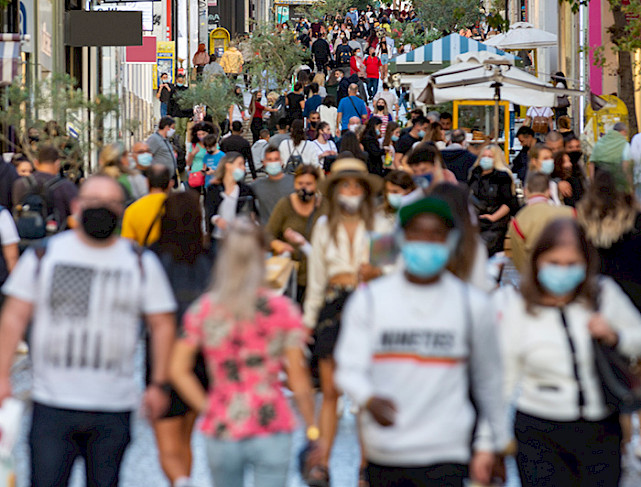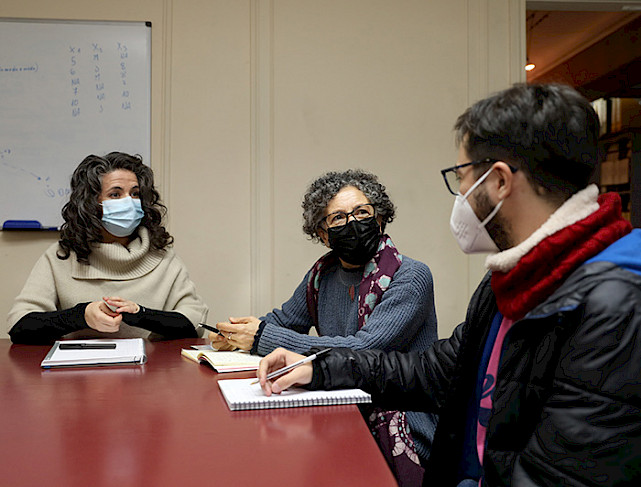Interview with Dra. Catterina Ferreccio: "My role in the Academy will be to support the arrival of women"

The researcher, academic of Medicine UC, director of the Doctorate in Epidemiology, and Deputy Director of the Advanced Center for Chronic Diseases, ACCDiS , tells how it has made its way in scientific environments with a strong male presence. She declares herself a fan of gender quotas and believes that immigration has helped Chileans understand that there are other knowledges.. In this interview he talks about his expectations at the Academy of Medicine, of his time in the Covid-19 Council and the project he leads in Araucanía.
With more than 170 publications in scientific journals, the Professor of Medicine and recently appointed a Member of the Academy of Medicine, DRA. Catterina Ferreccio, has focused on a search that has to do with health and prevention, with looking at people, in the population. (Photo credit: Karina Fuenzalida)
At 69 years old, Catterina Ferreccio says with some tranquility that she has lived everything she had to live. And your work resume proves you right: is a full professor of Medicine at uc, deputy director of the Advanced Center for Chronic Diseases of that house of studies and of the U. of Chile, and director of Cohorte MAUCO, a project he carries out in Molina, Maule region.
With more than 170 publications in scientific journals, your search has to do with health and prevention, with looking at people, in the population. Topics such as the natural history of gallbladder cancer; the prevention of stomach cancer – the leading cause of death in Chile; the long-term effects of arsenic exposure in drinking water; screening for cervical cancer; and the study in the population of chronic diseases and cancer, are part of your research. "It's hard to say which of these relevant projects I'm most fond of.. They are like children or grandchildren, one loves them all", Catterina account, sitting in the hall of the UC Medicine building.
Every now and then she smiles and waves to the doctors and students who pass by and recognize her.. Outside it rains with intensity and she wears black booties with platform, a long leather coat and a red umbrella. Native of Arica, the researcher confesses that when she returns to the north she is always excited to see the desert from the plane. "It's something super weird and special that happens to me", says in his soft voice.
She is a member of the Covid-19 Advisory Council since the beginning of the pandemic and has just been appointed as a member of the Chilean Academy of Medicine, place where the male presence, historically, has been stronger.
Internationally, their collaborative networks reach the universities of Maryland and California-Berkeley and the National Cancer Institute -in the United States- and Heidelberg -Germany-, together with the International Agency for Research on Cancer (International Agency for Research on Cancer, located in France).
-In the ceremony at the Academy of Medicine she said that it was a tremendous satisfaction that she has been named because she is a woman and "the Academy has historically been a somewhat vetoed space for us". How do you explain that veto??
-It was a bit of a strong word. I meant we couldn't get in, simply, as in many other places, how to be Minister of the Interior, for example. Nor is it explicitly forbidden., but it was a place of men. In recent decades we became 10% within the academy and now last it has been rising rapidly to 17%. That has to do with the times., but also with the fact that there are women inside who begin to ask for more parity (…). 10 or 20% is very little, especially if we consider that women who graduate year after year from Medicine, in Chile, are 50% of the total.
– How can you understand that??
– Women have a much harder time being productive than the classic way of publishing, because we are immersed in a system in which we are in charge of the children and the house, and more adults than parents or grandchildren. It's super scrubbed, I lived it. To be able to stand out one has to work hard, double, and also be lucky (…). I had to analyze this issue during the pandemic – in 2021, in Europe and the United States-, and it's awesome: men have produced more scientific manuscripts than they did pre-pandemic and have applied for more projects. But women have gone down in both., Therefore, the gap widened. Despite all the discourse of reducing the gender gap, that still doesn't materialize. It's a shame., but all you have to do is keep going, show it and report it.
– He also said at the ceremony that "I am glad that they recognize a discipline that is not clinical in essence but rather research such as epidemiology.", area you lead in college.
– Yes, medicine is not all health, it has more to do with the sick. I'm in the area of health which is also related to staying healthy., with prevention and developing to the maximum the potentialities of the human being. This has been an area that, for clinicians who have led the Academy of Medicine, has been a bit alien.
– Can the focus shift from recognizing the importance of research in areas such as epidemiology or other less clinical areas??
– More than changing the focus, I would say broaden the look, which is what we need today across the board. The epidemiology that I practice can be exercised by other disciplines. However, medicine gives you certain privileges and facilities to understand the body of the individual and his diseases. When you jump from the individual to the population, having this knowledge, allows you to be much more assertive. I think it's super important that there are doctors in epidemiology and that the Academy welcomes them..
– Is the Academy a place from which important messages can be passed on to decision-makers and the population itself?? What role do you expect to have there??
– My expectations are that the Academy will play it for public policies, who gives his opinion and becomes an actor. And that my voice can be amplified and have more impact from there.
Researchers vs. WHO

“(…) I quickly realized that epidemiology was central to what needed to be done.. Understand, for example, that we could contain the arrival of the virus by isolating the first case that was registered in the country”, account Catterina Ferreccio, member of the Covid-19 Advisory Board. (Photo credit: iStock Photo)
– Regarding the impact on public policies, you were and remain a member of the Covid-19 Advisory Board. What was the most complex thing??
– The strangest thing was that former Minister Mañalich called me, because at that time I was working on cancer. But I quickly realized that epidemiology was central to what needed to be done.. Understand, for example, that we could contain the arrival of the virus by isolating the first case that was registered in the country. But the Ministry of Health and the Medical College disagreed with that recommendation.. As a group we come together, because we agreed on what had to be done and we realized that it was not going to be easy to be heard..
– And how did your role on the board evolve??
– I felt like I couldn't leave because there were different views of the problem and I think it was super good that I stayed.. Those of us who are dedicated to research have a lot of familiarity with the evidence., we can read and understand it. For example, with the topic of vaccines, it was obvious that the old people had to be vaccinated with the first thing that came, because the hospital burden had to be lowered; that the borders had to be closed and the entire population had to wear a mask. In the latter we disagreed with the WHO and fortunately the Ministry of Health listened to us.
– Did this demand a lot of your day-to-day life??
– In order to have that strength you had to be studying all day.. Ask my husband (laughter), Said: "Catterina is Covid, Covid, Covid", because he read other things or watched news. If there were seminars with researchers or doctors from China or Geneva I participated, to be able to ask things they were living at the time. I left my projects well thrown out. When the government changed, some people on my team told me.: "How good, Catterina, we're going to have you back". But I'm still there. (laughter).
– How do you assess the management of the pandemic in Chile??
– In the first outbreak we were one of the countries with the highest mortality in the world, in rate. It was tremendous.. Former President Piñera quickly took up the issue of the vaccine and a group from the UC told him that we had to start moving and offer clinical field in Chile so that they would come and evaluate the vaccine., in exchange for committing millions of doses. That saved us from remaining the country with the highest mortality.. But we were going wrong. Not stopping the first outbreak was a diagnostic error, it was decided to ensure the care of COVID-19 cases by buying ventilators and recycling beds to attend ICU. For almost a year the population with other health problems had great difficulty accessing hospitals. Many people were left without attention and we will pay for it in the coming years.
The gender gap in science

“My role at the Academy is going to be to support the arrival of women. There are women who are great, have worked hard and have sensitivity. We must help make them visible and that these other voices come”, says Catterina Ferreccio convinced. (Photo credit: Karina Fuenzalida)
“My role at the Academy is going to be to support the arrival of women. There are women who are great, have worked hard and have sensitivity. We must help make them visible and that these other voices come”, says Catterina Ferreccio convinced. (Photo credit: Karina Fuenzalida)
Catterina remembers her beginning in one of the most successful research centers in Chile, the Center for advanced chronic diseases, where she is deputy director. There are six principal investigators: one woman and five men. Catterina, In addition, is the only one that comes from the areas of public health and epidemiology. "It was super hard to put my issues on the table.. It cost me a lot, to the point that one of them told me one day: 'But, What do you do?? You don't do science', because I'm not in the lab. That happened eight years ago., when we leave. Last week we had a meeting and I thought about how he has changed his understanding of what I do., because he said: 'I agree with catterrina.'".
– What has cost you the most??
– The different vision of the world of our disciplines. People who have been working in a laboratory at the molecular level for decades and can't imagine how to translate their science for people's well-being.. Our role is to be the bridge, propose policies and interventions derived from knowledge. But also the genre cost me a lot, the form of the deal. A couple of times I had to leave meetings to regain strength. It has to be at least two women, because if one is treated badly, the other defends you while you replenish yourself.
– Do you believe in quotas??
– Yes, I'm a fan of them, until necessary. Because don't come to me with stories, there is no way a young woman can cope with this, Single. My role at the Academy is going to be to support the arrival of women. There are women who are great, have worked hard and have sensitivity. We must help make them visible and that these other voices come.
– More diversity overall, you say.
– Yes. I think immigrants have made a tremendous contribution to this country.. It is almost politically incorrect to say so., but pucha that the Venezuelans have done us good, Peruvian, Bolivians and Haitians! They have shown us that there are more people than Chileans in the world. That there are more ways, Aesthetic, meals and knowledge. How Venezuelan and Peruvian doctors treat people, it's very different. They treat with affection, care, are friendly, they teach the patient. We are more authoritarian and distant.
I lead research projects in Maule and Araucanía, and Venezuelan doctors have approached spontaneously to ask what they can help, because they would like to investigate. They are always foreigners... it's super curious.
– About his project in La Araucanía, called Cohort Chile BiLS, it is striking that, despite the pandemic and conflicts in the area, no day have they stopped taking samples.
– Yes, we are following a group of about 5,000 women in the area, who had gallbladder stones (…). We have never had problems in the region. People know the team and we move in the ambulances that have the logos of the universities, the UC and La Frontera. We go to their homes in mobile clinics. We have never felt hostility or fear of going anywhere. We have only been stopped by rain and mud in rural areas.
The future
– How do you look in 10 years? Where would you like to be?
– That's a tough question.. I would like to paint again. I paint in oil and acrylic. My husband every so often wants to throw away my small and big lecterns, and I say no, that I'm going to repaint (laughter).
Original interview in HTTPS:www.uc.cl/noticias by carla.alonso@uc.cl
